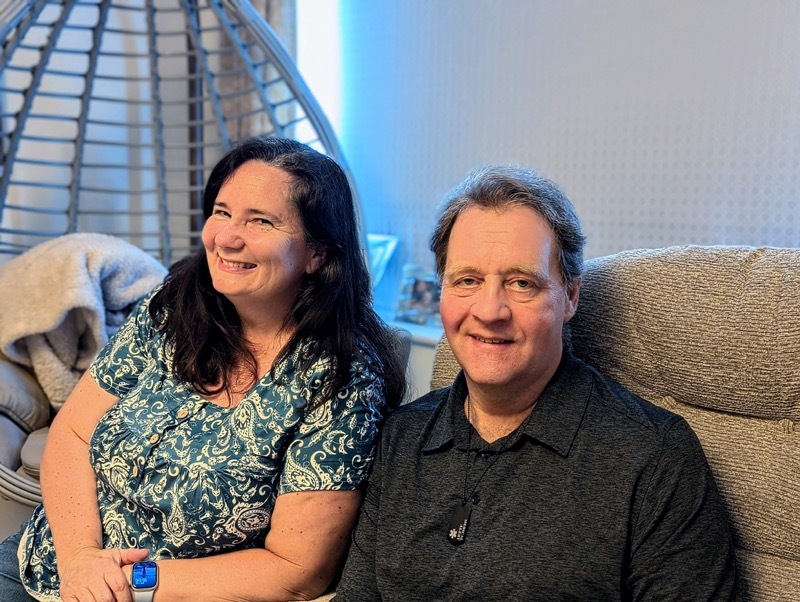A MAN whose body can fail him at any moment due to a rare disorder - which was recently revealed to have put an end to Celine Dion’s singing career - has found support by connecting with people across the globe.
Ian Rawlins, 60, suffers with stiff person syndrome (SPS), a neurological disorder that affects around one in a million people, causing their body to freeze in place as they suffer with painful muscle spasms.
Due to its rarity, little is still known about the disorder and there is no cure.
Ian’s 56-year-old wife, Andrea - who was nominated as Carer of the Year at last year’s Proud of Barnsley awards and suffers with mobility issues herself - has changed her way of life to support her husband.
The couple live in constant fear as they’re aware that disaster could strike anytime ‘night or day’.
As these spasms - which can last for hours - are triggered by sensory changes such as touch, sound or even temperature, simple tasks like going to the shop become an incredible challenge, forcing them to spend most of their time at home.
Despite the isolation these changes have caused the couple from Wombwell, they’ve found solace online, where they’ve been making videos on social media to raise awareness and connect with others going through similar situations.
Ian told the Chronicle: “It’s one in a million, but that sounds like a speck of dust.
“It’s reassuring that there are people out there going through the same thing.
“And that’s the same for the other people, who are coming to us and saying the same thing - it helps them, knowing that we’re out there.”
Andrea added: “It’s so supportive, because we have built up proper friendships with people.
“We have chats for quite a long time - it helps them as we can discuss what they’ve gone through and try to raise awareness.”
Awareness of the disorder recently rose thanks to Amazon Prime’s new documentary I Am Celine Dion, which shows the celebrity singer’s struggles with SPS and how it has changed her life.
The best-selling singer - who performed the song ‘My Heart Will Go On’ for the film Titanic - has had to give up her musical career due to these ongoing health issues.
While Andrea applauds the documentary, believing Celine has helped ‘legitimise’ the condition, it’s only the first step as people like Ian are facing constant confusion, even from healthcare professionals.
“For a long time, doctors couldn’t believe how long his spasms last for,” Andrea said.
“I’d be telling them it lasted this length of time, but it’s only when they witness it themselves they believe it.
“We’ve had people come out with the occupational therapist and leave in utter shock and horror when they witness what happens.
“So that’s what we were trying to do basically - we set out first of all that I wanted the ambulance crews to know about it, I wanted the doctors to know about it and I wanted them to have a more understanding attitude.
“When Ian was taken to hospital by ambulance they didn’t know what to do so were trying to get hold of specialists - it was near Christmas time so there was nobody available and they said they’d have to admit him and he’d probably be in about a week.
“I was saying ‘no, no, no, that’s no good he will carry on spasming’.
“When he was spasming at Northern General they were trying to move him to A and E and I was telling them ‘please don’t move him, it will make things so much worse’.”
This confusion extends to treatment, which Andrea describes as a ‘stab in the dark’, with no tailored treatment available and doctors attempting to help with other options like chemotherapy and immunotherapies.
Through social media, more and more people are getting in touch with Ian and Andrea, asking him what treatments are available and for any advice.
This growing community - who are getting the opportunity to share their own stories and videos through Andrea’s page - has now been noticed and shared by people such as author Donna Ashworth and photographer Misan Harriman.
Through all these issues though, Ian isn’t giving up as he’s committed to ‘getting on’ with life.
Ian said: “I think lots of people do suffer with their mental health.
“When I’m in full spasm it’s absolute agony, crippling really.
“Once the spasm is over, I’m exhausted
“I’ve been in spasm today, so tomorrow I’ll be struggling just to move around.
“But I’ve accepted that I’ve got this condition - I know there’s no cure.”
https://www.youtube.com/watch?v=Vb1XCQ6—OlU - a link to a YouTube video showing how the condition affects Ian...




























